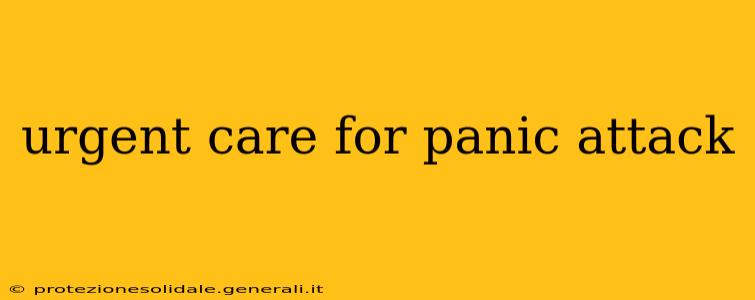Panic attacks can be terrifying, leaving you feeling overwhelmed by intense fear and physical symptoms. Knowing when to seek urgent care is crucial for managing these episodes and preventing future occurrences. This guide will explore when you should head to urgent care for a panic attack, what to expect, and how to manage them in the future.
What is a Panic Attack?
Before diving into when to seek urgent care, it's important to understand what constitutes a panic attack. A panic attack is a sudden episode of intense fear that may feel like you're losing control. Symptoms can include a racing heart, shortness of breath, chest pain, dizziness, trembling, sweating, and feelings of impending doom. These symptoms often peak within minutes and can be incredibly distressing. While panic attacks are not life-threatening in themselves, the intensity of the symptoms can be frightening and necessitate medical attention in certain situations.
When Should I Go to Urgent Care for a Panic Attack?
This is a crucial question, and the answer depends on several factors. Here's a breakdown of situations warranting urgent care:
1. First-Time Panic Attack: If you've never experienced a panic attack before, seeking medical attention is essential to rule out any underlying medical conditions mimicking a panic attack, such as a heart problem or hyperthyroidism. A healthcare professional can perform a thorough evaluation and provide a proper diagnosis.
2. Severe or Unmanageable Symptoms: If your symptoms are exceptionally severe—for example, you're struggling to breathe, experiencing intense chest pain, or feel like you might faint—urgent care is necessary. These situations require immediate medical assessment and intervention.
3. Panic Attack Accompanied by Other Symptoms: If your panic attack is accompanied by other concerning symptoms such as severe dizziness, persistent nausea or vomiting, or changes in vision, seek immediate medical attention. These could indicate a more serious underlying medical issue.
4. Suicidal Thoughts or Self-Harm: If you experience suicidal thoughts or urges to self-harm during or after a panic attack, seek immediate help. Contact emergency services or go to the nearest emergency room.
5. Panic Attacks Becoming More Frequent or Severe: If your panic attacks are becoming increasingly frequent, severe, or disruptive to your daily life, seeking professional help is vital. A healthcare provider can help develop a treatment plan to manage your condition.
What to Expect at Urgent Care
When you arrive at urgent care for a panic attack, the medical staff will conduct a thorough assessment of your symptoms and medical history. They may perform an electrocardiogram (ECG) to rule out any heart problems and take your vital signs (blood pressure, heart rate, respiratory rate). They might also order blood tests if necessary to help rule out other medical causes. The healthcare provider will likely discuss your symptoms, coping mechanisms, and any underlying mental health conditions. They might prescribe medication to help manage your symptoms or recommend therapy.
What if I Don't Need Urgent Care? What are other ways to manage a panic attack?
If your panic attack is manageable and doesn't meet the criteria for urgent care, here are some techniques that can help:
- Practice deep breathing exercises: Slow, deep breaths can help calm your nervous system.
- Grounding techniques: Focus on your senses – what do you see, hear, smell, taste, and touch? This can help bring you back to the present moment.
- Progressive muscle relaxation: Tense and release different muscle groups to reduce physical tension.
- Cognitive restructuring: Identify and challenge negative or catastrophic thoughts.
How can I prevent future panic attacks?
While it is not always possible to prevent future panic attacks, several strategies can significantly reduce their frequency and intensity:
- Therapy (Cognitive Behavioral Therapy (CBT) is particularly effective): CBT helps identify and challenge negative thought patterns and develop coping mechanisms.
- Medication: Your doctor may prescribe medication to manage anxiety, such as selective serotonin reuptake inhibitors (SSRIs) or benzodiazepines (for short-term relief).
- Lifestyle changes: Regular exercise, a healthy diet, sufficient sleep, and stress management techniques can significantly impact anxiety levels.
Remember, seeking help is a sign of strength, not weakness. Don't hesitate to reach out to a healthcare professional if you're struggling with panic attacks. Effective treatment is available, and you can learn to manage your anxiety and lead a fulfilling life.
